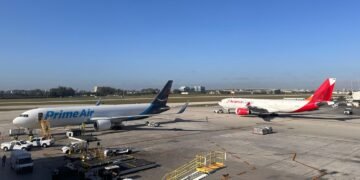James Hookham, CEO of the Global Shippers Association, a member of the Global Air Cargo Advisory Group, considers a ‘No Deal’ Brexit – both the potential challenges and the information that is currently available.
The long-running saga of the UK’s decision to leave the European Union (EU), following a national referendum three years ago this May, has bemused and confused logistics and supply chain managers as they endeavour to assess the consequences for their cargo flows.
The challenge has been made immensely more difficult because neither the terms of the future trading relationship, nor when the new relationship will commence, are known. Rarely have businesses been expected to plan in such a fog of uncertainty.
But of all the risks posed to the conduct of international trade by Brexit, the impact on air transport services could generate some of the more immediate and high-profile consequences.
Severity of the impact
The severity of the impact depends on the manner of departure and what arrangements are available to replace the current free movement of goods and aircraft available under EU membership. The most talked about scenario is a ‘No Deal’ Brexit where the UK simply leaves all the EU institutions, including the Customs Union and Single Market, without any negotiated alternative trading arrangements in place and reverts to third-country status in the EU’s eyes.
Not only would flying rights and code sharing arrangements be jeopardised, so too would mutual recognition of airworthiness certifications, fight crew qualifications and the status of security clearances for air cargo, amongst many others.
Given the high degree of integration of airline fleets, the wide use of UK-approved certifications for parts and aircraft, and the extensive route networks of UK-based airlines, it would not just be flights to and from the UK that would be affected.
Handled badly, one of the first effects of a No Deal Brexit could be the grounding of large numbers of aircraft right across the EU, literally overnight, as the legal validity of approvals, certifications, and flying permissions unravelled. But the plan is to not handle Brexit badly.
The Withdrawal Agreement concluded between the British Government and the European Council in December 2018 contains a transition period until the end of 2020, during which all the current trading and transport arrangements will continue while the UK and EU negotiate a new permanent free trade agreement, including a new Air Services Agreement.
These would be expected to contain many of the current features of ‘frictionless’ trade and transport integration, which would be implemented as the transition period expired. Handled really well, a negotiated Brexit could go almost unnoticed at operational level in many areas of commerce, including air transport.
That relatively benign scenario relies on the Withdrawal Agreement being ratified by the House of Commons and subsequently by the newly elected European parliament. At the time of writing, there is no certainty that this will happen before the revised official Brexit date of October 31 this year.
A No Deal Brexit remains a high probability risk for businesses and despite the lull, no business involved in flying or hauling goods between the UK and Europe should relax its contingency planning.
Faced with a possible ‘grounding of aircraft’ scenario and an inevitable public backlash about cancelled passenger flights, both the UK government and the EU agreed contingency plans to ‘keep the planes flying’ in the event of a no deal Brexit.
The EU passed regulations that would allow some, but not all, of the current flying freedoms for UK airlines to continue, and key certifications for air cargo security would still be recognised until March 2020. nearly all of these measures would be reciprocated by the UK.
Plan B
So in the event of a No Deal Brexit, there is at least a plan B for air transport, and importantly for air freight, which would require changes and adaptations but would allow many services to continue, albeit on a temporary basis. If you are affected, it is important to check out the respective details for the EU here: www.easa.europa.eu/brexit, and for the UK here: info.caa.co.uk/eu-exit/airlines-and-aoc-holders/
Significant volumes of air freight are also moved by road haulage between EU and UK destinations via the Dover Straits ferry crossings or by Channel Tunnel shuttle services. The impact of a No Deal Brexit on these services, where Customs declarations and regulatory checks on goods would be re-imposed for the first time in over 25 years, has been the main focus of contingency planning for governments, border agencies, and affected businesses for many months.
The No Deal procedures for these routes have now also been published by both the UK and the EU (separately!) and these include other temporary concessions to ease the flow of goods and traffic through this vital freight corridor.
Even trade between the UK and the rest of the world would be affected by a No Deal Brexit. Because the UK would leave the EU Customs Union it would be able, indeed required, to decide its own tariffs on imported goods.
Currently these are set under EU trade deals and a continuing source of uncertainty is which of these EU deals will be replicated by new bilateral arrangements with the UK by the date of Brexit.
For a period in March, there were goods at sea where the duty payable upon landing in the UK was simply unknown and unknowable, given the political uncertainty.
At a global level, Brexit is a microcosm of the consequences of major economies re-setting their trading relationships. Whilst a big deal in the UK (and to a lesser extent in the EU), it is dwarfed by the scale of change resulting from the introductions of tariffs on trade between the US and China.
Navigating the logistical challenges arising from political differences has always been part of the day-job for those involved in supply chain and logistics management, and one that they do brilliantly, but at a cost and a diversion of resources that could be used for more productive purposes.
Through the Global Air Cargo Action Group (GACAG), which provides a collective voice for the air cargo sector, GSF (Global Shippers’ Forum) and TIACA, together with our partners IATA (international Air Transport Association) and FIATA (the International Federation of Freight Forwarders’ Associations), will continue to make a powerful and compelling case for the benefits of a low- friction trade that is ultimately in the best interests of citizens everywhere, as well as for the air cargo interests we represent.
Pictured above: GACAG board members pictured at the TIACA ACF 2018 in October, Toronto, Canada. Left to right: Sean van Dort, Director of Global Logistics at MAS Holdings, Sri Lanka, and Chairman of the Global Shippers’ Forum (who is not a GACAG Board member); James Hookham, Secretary General of the GSF, and acting secretary of GACAG; Glyn Hughes, Global Head of Cargo at IATA; Bill Gottlieb, representing FIATA; Vladimir Zubkov, Secretary General, TIACA.







